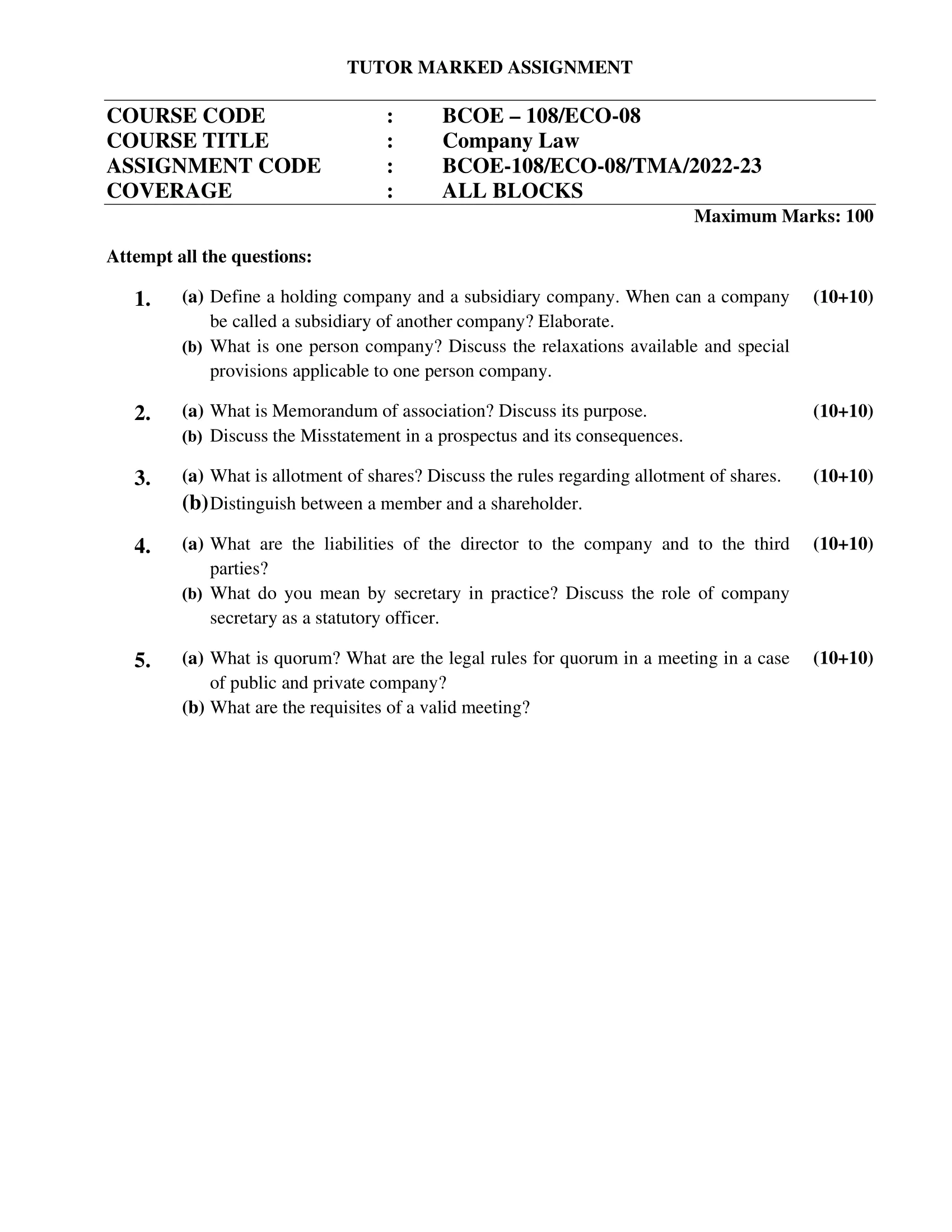Contents
- 1 1. (a) Define a holding company and a subsidiary company. When can a company be called a subsidiary of another company? Elaborate.
- 2 (b) What is one person company? Discuss the relaxations available and special provisions applicable to one person company.
- 3 2. (a) What is Memorandum of association? Discuss its purpose.
- 4 (b) Discuss the Misstatement in a prospectus and its consequences.
- 5 3. (a) What is allotment of shares? Discuss the rules regarding allotment of shares.
- 6 (b) Distinguish between a member and a shareholder.
- 7 4. (a) What are the liabilities of the director to the company and to the third parties?
- 8 (b) What do you mean by secretary in practice? Discuss the role of company secretary as a statutory officer.
- 9 5 (a) What is quorum? What are the legal rules for quorum in a meeting in a case of public and private company?
- 10 (b) What are the requisites of a valid meeting?

| Title | BCOE-108/ ECO-08: IGNOU B.Com Solved Assignment 2022-2023 |
| University | IGNOU |
| Degree | Bachelor Degree Programme |
| Course Code | BCOE-108/ ECO-08 |
| Course Name | Company Law |
| Programme Name | B.Com |
| Programme Code | BDP |
| Total Marks | 100 |
| Year | 2022-2023 |
| Language | English |
| Assignment Code | BCOE-108/ECO-08/TMA/2022-23 |
| Assignment PDF | Click Here |
| Last Date for Submission of Assignment: | For June Examination: 31st April For December Examination: 30th September |

1. (a) Define a holding company and a subsidiary company. When can a company be called a subsidiary of another company? Elaborate.
Ans: A holding company is a type of business organization that owns a controlling interest in one or more other companies, which are referred to as subsidiaries. The primary purpose of a holding company is to own and manage the assets of its subsidiaries, without necessarily being directly involved in their day-to-day operations.
A subsidiary company, on the other hand, is a separate legal entity that is controlled by another company, known as its parent or holding company. The parent company owns a majority of the subsidiary’s stock, which gives it the power to make strategic decisions and exercise control over the subsidiary’s operations.
A company can be called a subsidiary of another company when the parent company owns more than 50% of the subsidiary’s stock. This means that the parent company has a controlling interest in the subsidiary and can exert significant influence over its operations.
In addition to ownership, a subsidiary may also be created through a contractual arrangement between the parent company and the subsidiary, such as a joint venture or a licensing agreement. In these cases, the subsidiary is still a separate legal entity, but it operates under the direction and control of the parent company.
Subsidiaries can be used for a variety of purposes, including expanding into new markets, diversifying a company’s product or service offerings, or accessing new technology or intellectual property. By establishing subsidiaries, parent companies can also limit their exposure to risk and liability, as each subsidiary is responsible for its own debts and obligations.
(b) What is one person company? Discuss the relaxations available and special provisions applicable to one person company.
Ans: A One Person Company (OPC) is a type of company introduced in India under the Companies Act, 2013, which allows a single person to start and operate a business with limited liability. In an OPC, the individual holds all the shares and is the sole director, providing full control over the company’s operations.
The concept of OPC is beneficial for small entrepreneurs who can operate their business with limited liability and minimal regulatory compliance. The OPC provides a separate legal entity to the individual, protecting their personal assets from the company’s debts or losses.
Relaxations available for One Person Company (OPC):
- Minimum number of members: A single person can form and operate an OPC, unlike other types of companies that require a minimum of two members.
- No requirement of holding AGM: The requirement of holding Annual General Meetings (AGMs) does not apply to OPCs.
- Fewer compliances: OPCs have to comply with fewer regulatory requirements than other companies, such as fewer board meetings and no requirement for a company secretary.
- Nominee: OPCs must appoint a nominee to take over the company’s management in the event of the director’s death or incapacity.
Special Provisions Applicable to One Person Company (OPC):
- Sole Director: An OPC can have only one director, who can also be the sole shareholder of the company.
- Memorandum and Articles of Association (MOA/AOA): An OPC must have MOA/AOA in place that specifies the company’s objectives and rules for its operations.
- Conversion to Private Limited Company: OPC can convert into a Private Limited Company only after completing two years of its incorporation or reaching a paid-up capital of Rs. 50 Lakhs, whichever is earlier.
- Penalty for Non–Compliance: The penalties for non-compliance with regulatory requirements are higher for OPCs than for other types of companies.
2. (a) What is Memorandum of association? Discuss its purpose.
Ans: The Memorandum of Association (MOA) is a legal document that sets out the fundamental principles and objectives of a company. It is one of the essential documents required for the formation of a company under the Companies Act, 2013, and it governs the company’s relationship with the outside world.
The MOA contains important information about the company, such as its name, registered office address, objectives, and the amount of authorized share capital. It serves as a guidebook for the company’s activities, outlining the scope of its operations, and providing a framework for decision-making.
The purpose of the Memorandum of Association (MOA) is to define the company’s objectives and the scope of its activities. It provides clarity to the shareholders, creditors, and other stakeholders about the company’s purpose and how it intends to achieve its objectives. The MOA also serves as a legal agreement between the company and its shareholders, defining their rights, responsibilities, and obligations.
Some of the key purposes of the Memorandum of Association are as follows:
- Defines the Company’s Name and Registered Office: The MOA specifies the company’s name, which must be unique and not similar to any existing company’s name. It also specifies the company’s registered office address, which is the official address of the company for all communication.
- Sets out the Objectives and Scope of the Company: The MOA outlines the company’s objectives and scope of its operations, defining the activities in which the company can engage. It provides clarity to the shareholders, creditors, and other stakeholders about the company’s purpose and how it intends to achieve its objectives.
- Determines the Authorized Share Capital: The MOA specifies the amount of authorized share capital, which is the maximum amount of capital that the company can raise through the issuance of shares.
- Defines the Relationship between Shareholders and the Company: The MOA defines the relationship between the shareholders and the company, outlining their rights, responsibilities, and obligations. It also specifies the rules for the transfer of shares and the distribution of profits.
(b) Discuss the Misstatement in a prospectus and its consequences.
Ans: A prospectus is a legal document that provides information about a company’s shares or debentures to potential investors. It contains important details about the company’s business operations, financial statements, and risk factors associated with the investment. A misstatement in a prospectus occurs when the information provided in the prospectus is false or misleading.
The consequences of a misstatement in a prospectus can be severe and may result in legal action against the company and its directors. Some of the consequences of misstatement in a prospectus are:
- Legal Action: If a misstatement is discovered in a prospectus, investors may take legal action against the company and its directors. The Securities and Exchange Board of India (SEBI) has the power to investigate and prosecute cases of misstatement in a prospectus.
- Refund of Investment: Investors who have suffered losses due to a misstatement in a prospectus may seek a refund of their investment. In such cases, the company and its directors may be required to compensate the investors for their losses.
- Criminal Liability: Directors who are found guilty of making a misstatement in a prospectus can be held criminally liable. They may face imprisonment, fines, or both.
- Damage to Reputation: A misstatement in a prospectus can damage the company’s reputation and credibility. It can erode investor confidence and make it difficult for the company to raise funds in the future.
To avoid misstatement in a prospectus, the company and its directors must ensure that the information provided in the prospectus is accurate and complete. They must conduct due diligence to verify the accuracy of the information and disclose all material facts that may impact the investment decision of the investors.
Ans: Allotment of shares refers to the process of allocating shares to shareholders who have applied for them. The allotment of shares is an important step in the process of raising capital through the issuance of shares.
The rules regarding allotment of shares are governed by the Companies Act, 2013, and the Securities and Exchange Board of India (SEBI) regulations. Some of the key rules regarding allotment of shares are:
- Time Limit for Allotment: The company must allot shares within 60 days from the date of receipt of the application money. If the company fails to allot shares within this time limit, it must refund the application money to the investors within 15 days.
- Allotment in Proportion: The company must allot shares to the investors in proportion to the number of shares applied for. If the company receives more applications than the number of shares offered, it must allot shares on a proportionate basis.
- Allotment Letter: The company must issue an allotment letter to the investors who have been allotted shares. The allotment letter must contain details such as the number of shares allotted, the amount paid-up, and the date of allotment.
- Payment of Share Application Money: The investors must pay the share application money at the time of submitting the application. The company cannot allot shares if the application money is not paid.
- Approval from Registrar of Companies: The company must obtain approval from the Registrar of Companies (ROC) before allotting shares. The ROC verifies that the allotment has been made in accordance with the rules and regulations.
- Shares to be Fully Paid-up: The company must ensure that the shares allotted are fully paid-up. The investors must pay the balance amount due on the shares within the time limit specified by the company.
Ans: The terms “member” and “shareholder” are often used interchangeably in the context of a company, but they have different meanings. The key differences between a member and a shareholder are:
- Legal Status: A member is a person who has agreed to become a member of a company and whose name appears on the register of members maintained by the company. A shareholder, on the other hand, is a person who owns shares in the company.
- Rights and Obligations: Members have certain rights and obligations under the Companies Act, such as the right to vote at meetings, receive dividends, and participate in the management of the company. Shareholders, on the other hand, have rights such as the right to receive dividends and to attend meetings, but they may not have the same level of involvement in the management of the company.
- Liability: Members and shareholders have different levels of liability. Members have limited liability, which means that their liability is limited to the amount of unpaid share capital they have subscribed to. Shareholders may have limited or unlimited liability, depending on the type of shares they hold.
- Transferability of Shares: Shareholders can transfer their shares in the company to another person, while members cannot transfer their membership.
4. (a) What are the liabilities of the director to the company and to the third parties?
Ans: Directors have certain legal obligations and duties to both the company and third parties, and can face liabilities if they breach these obligations and duties. The following are some of the key liabilities of directors to the company and third parties:
- Duty of Care: Directors have a duty of care to the company, which requires them to act in the best interests of the company and to exercise reasonable care, skill, and diligence in carrying out their responsibilities. If a director breaches this duty, they may be held liable to the company for any losses suffered as a result of their actions.
- Duty of Loyalty: Directors have a duty of loyalty to the company, which requires them to act in good faith and not to use their position to gain personal benefit at the expense of the company. If a director breaches this duty, they may be held liable to the company for any losses suffered as a result of their actions.
- Fiduciary Duty: Directors have a fiduciary duty to the company, which requires them to act in the best interests of the company and to put the interests of the company above their own interests. If a director breaches this duty, they may be held liable to the company for any losses suffered as a result of their actions.
- Duty to Disclose: Directors have a duty to disclose any conflicts of interest they may have with the company or any transactions involving the company. If a director fails to disclose a conflict of interest or breaches this duty in any other way, they may be held liable to the company for any losses suffered as a result of their actions.
- Liability to Third Parties: Directors can also be held liable to third parties if they breach any legal obligations owed to third parties, such as obligations under contract, tort law, or securities law.
(b) What do you mean by secretary in practice? Discuss the role of company secretary as a statutory officer.
Ans: In practice, a company secretary is a senior executive who is responsible for ensuring that the company complies with all legal and regulatory requirements, as well as implementing and maintaining good governance practices within the organization.
As a statutory officer, the role of the company secretary is established by law and is essential for the smooth and efficient operation of the company. The following are some of the key responsibilities and duties of a company secretary as a statutory officer:
- Compliance: The company secretary is responsible for ensuring that the company complies with all applicable laws and regulations, including company law, securities law, and tax law.
- Board Support: The company secretary is responsible for providing support to the board of directors, including preparing and distributing board materials, scheduling board meetings, and ensuring that board decisions are properly recorded and implemented.
- Shareholder Relations: The company secretary is responsible for managing the company’s relationships with its shareholders, including preparing and distributing shareholder materials, managing shareholder meetings, and ensuring that shareholder rights are respected.
- Governance: The company secretary is responsible for implementing and maintaining good governance practices within the company, including developing and implementing policies and procedures, and ensuring that the company operates in an ethical and transparent manner.
- Record Keeping: The company secretary is responsible for maintaining the company’s statutory records, including minutes of meetings, share registers, and other legal documentation.
5 (a) What is quorum? What are the legal rules for quorum in a meeting in a case of public and private company?
Ans: A quorum is the minimum number of members required to be present at a meeting to make it valid and legally binding. The quorum is usually defined in the bylaws of an organization, and it can vary depending on the size and nature of the organization.
In the case of public companies, the rules for quorum are typically set out in the company’s bylaws and also governed by applicable state and federal laws. In general, public companies are required to have a quorum of at least a majority of the shareholders entitled to vote at the meeting. This means that if there are 100 shareholders entitled to vote, at least 51 shareholders must be present or represented at the meeting for there to be a quorum.
For private companies, the rules for quorum are usually set out in the company’s operating agreement, which is a document that outlines the rules and regulations of the company. The quorum requirements for private companies can vary depending on the provisions set out in the operating agreement.
In both public and private companies, the quorum requirement ensures that decisions are made by a sufficient number of members and that the decisions are representative of the overall interests of the organization. If a quorum is not present, the meeting cannot proceed, and decisions cannot be made.
(b) What are the requisites of a valid meeting?
Ans: There are several requisites of a valid meeting, which include:
- Proper notice: The meeting must be properly noticed to all attendees, which means that the notice should include the date, time, and place of the meeting, as well as the agenda.
- Quorum: As mentioned earlier, a quorum is the minimum number of members required to be present at the meeting to make it valid and legally binding. The quorum requirement should be met before any business is transacted.
- Agenda: The meeting should have an agenda that outlines the topics to be discussed and any actions to be taken. The agenda should be distributed to all attendees prior to the meeting.
- Recording: Minutes of the meeting should be taken, which includes a record of the decisions made and any actions taken. These minutes should be approved at the next meeting.
- Participation: All attendees should be given an opportunity to participate in the meeting, express their opinions, and vote on any motions or proposals.
- Compliance with legal requirements: The meeting should comply with any legal requirements, such as those set out in the company’s bylaws, operating agreement, or applicable state or federal laws.
Ensuring that these requisites are met can help ensure that the meeting is valid and legally binding, and that decisions made at the meeting are properly documented and enforceable.
How to Download BCOE-108/ECO-08 Solved Assignment?
You can download it from the www.edukar.in, they have a big database for all the IGNOU solved assignments.
Is the BCOE-108/ECO-08 Solved Assignment Free?
Yes this is absolutely free to download the solved assignment from www.edukar.in
What is the last submission date for BCOE-108/ECO-08 Solved Assignment?
For June Examination: 31st April, For December Examination: 30th October
















